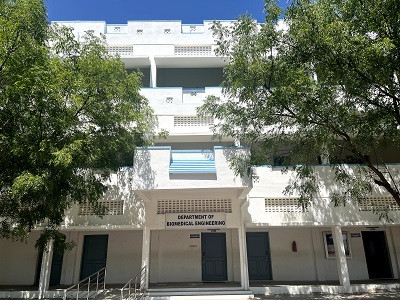The Department has well equipped Air conditioned laboratories with various softwares and equipments relevant to the industry standards.The following laboratories are associated with Biomedical Engineering Department.

The Diagnostic and Therapeutic Equipment Laboratory provides comprehensive practical training in advanced medical devices used for patient diagnosis, monitoring, and treatment. Students gain hands-on experience in operating, testing, and maintaining equipment such as ECG, EEG, defibrillators, ventilators, and other critical care instruments. The lab bridges theoretical knowledge with clinical application, emphasizing calibration, safety standards, and performance evaluation. It equips students with the technical competence and professional skills required for careers in biomedical engineering, hospital equipment management, and healthcare technology innovation.
The Biomedical Instrumentation Laboratory offers hands-on experience in the design, operation, and testing of instruments used to measure and analyze physiological parameters. Students learn to interface sensors and transducers for monitoring signals such as ECG, EEG, EMG, blood pressure, and respiration. The lab emphasizes circuit design, signal conditioning, data acquisition, and safety standards in biomedical systems. Through practical experiments, students bridge engineering principles with clinical applications, gaining essential skills for research, medical device development, and hospital technology management.
Image Processing Laboratory / Computing Center provides an advanced platform for learning and research in medical image analysis and biomedical computing. Students gain hands-on experience in image acquisition, enhancement, segmentation, and feature extraction using tools such as MATLAB and Python. The facility supports applications in medical diagnostics, computer vision, and artificial intelligence. It emphasizes algorithm development, visualization, and performance evaluation of image processing techniques. The lab equips students with computational and analytical skills essential for healthcare technology, research, and digital imaging innovation.
Anatomy and Human Physiology Laboratory provides foundational knowledge of the structure and function of the human body through practical exploration. Students study various organ systems, tissues, and physiological processes using anatomical models, charts, and experimental setups. The lab emphasizes understanding of cardiovascular, respiratory, nervous, muscular, and skeletal systems. It enables students to correlate theoretical concepts with biological functions essential for biomedical applications. This laboratory forms the basis for advanced learning in medical instrumentation, diagnostics, and healthcare technology.
The Embedded Systems and IoMT Laboratory provides hands-on experience in designing and implementing smart healthcare and biomedical applications using Raspberry Pi and microcontroller platforms. Students learn to interface biomedical sensors, acquire physiological data, and develop real-time monitoring systems connected through the Internet of Medical Things (IoMT). The lab emphasizes embedded programming, wireless communication, and cloud integration for remote health monitoring. Through practical projects, students gain skills in hardware–software co-design, system automation, and data analytics. This laboratory prepares students to innovate in intelligent medical devices and digital healthcare solutions.
The Project Laboratory provides a platform for students to design and develop innovative solutions to biomedical and healthcare challenges. It enables hands-on experience in prototyping, testing, and integrating medical technologies. The lab fosters creativity, teamwork, and technical skills essential for research and industry applications.
